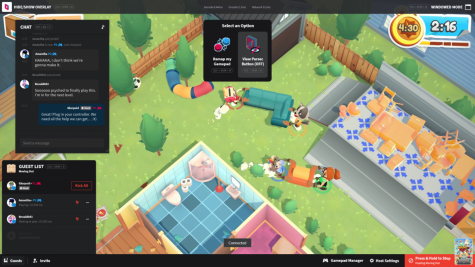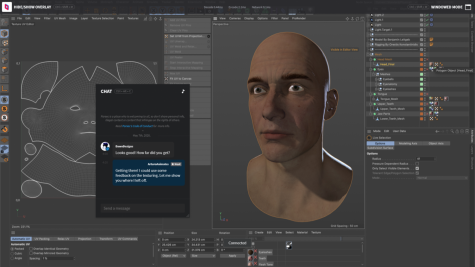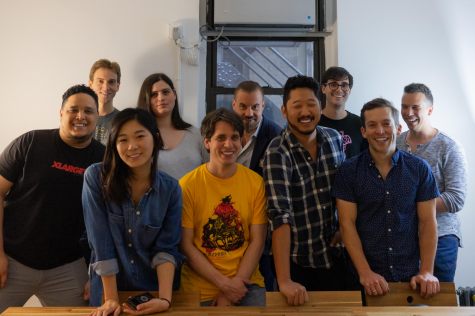Remote access offers pandemic-ready solution for gaming work and play
October 13, 2020
Before graduating from Columbia, Cole Bonnema, a 2020 game design alum, and their design team spent countless hours working on their own local multiplayer racing video game, “Scrap City Wreck Rally.”
When the time came to test their game ahead of Columbia’s Manifest Urban Arts Festival, the pandemic closed campus buildings and Bonnema’s team could not use the college’s resources.
Testing from home became a problem for members of the seven-person team because they lacked the capacity to fully assess the feel of the game together. So, Bonnema suggested they use Parsec to test the game and present it at Manifest.

Parsec is a remote access tool that allows people to connect their computers with their friends’ computers to play video games from anywhere with a high-quality, smooth performance, according to its website.
Users can also share access to their desktop or phone through a link provided by Parsec. Because of the pandemic, the software is also used for both everyday people working from home and industry professionals.
Tom Dowd, associate dean in the School of Media Arts, said he thinks remote work will be the way most things are going to be done in the video game industry moving forward. The game developers shifted “very easily” to remote production during the pandemic because the structure is similar to the commonplace server-client model of computing, he said.
“Most employees of game companies tend to have hardware at home that is comparable to what they would have in the office,” said Dowd, also an associate professor in the Interactive Arts and Media Department. “Companies also realize it’s worth it to invest $2,500 in their employees to give them a nice machine to have at home so they can continue to be productive.”
He said remote work impacts the video game industry by creating more job opportunities for students and saving companies the cost of moving employees in order for them to do work. Dowd said money is still a barrier for services like Parsec for Teams, a $30 monthly service, which was launched in April.
“The Microsofts of the world [have] the budgets to blow all that stuff out. But if you’re the little guy, it doesn’t matter how powerful the tool is, $500 a year is still too much,” Dowd said.
Parsec was founded in 2016 and currently has 14 full-time employees based in New York City.
Parsec’s service is part of a trend similar to Steam’s remote play and Google Stadia that allows people to play video games remotely from computers and phones.
Bonnema said the “biggest downside” of Steam remote play in comparison to Parsec is the the limitation of playing games owned through Steam’s publisher, Valve.
“You can only use it with your Steam friends like it’s obviously developing itself within the Valve ecosystem,” they said. “It’s not quite as freely usable.”
Max Sebela, head of marketing at Parsec, said its mission for the last four years has been to design optimized software with precise control.
“[Parsec] was born out of a desire to have the ability to play games with very good control from anywhere,” Sebela said.
Users can screen share video game titles and plug in a second controller to play games a friend owns for a couch co-op experience. In Parsec’s matchmaking feature, called Arcade, users can play games with random people around the world.

Sebela said Parsec is working with video game developers and publishers like Electronic Arts, Volition, Square Enix and Ubisoft on game testing and development through Parsec for Teams.
“We have so many of our favorite games now being made through Parsec … they would not be on track or on schedule right now if those teams weren’t able to connect through our service,” Sebela said. “It’s incredibly humbling.”
Kenny O’Brien, a content creator for the YouTube channel YoVideoGames, said his friends meet up and play arcade, fighting and cooperative video games together for the channel. O’Brien said YoVideoGames has not been able to meet in person since March, but he uses Parsec to maintain his personal connections while making videos.
“It’s not as good as being there but it’s the next best thing,” O’Brien said. “I still really get that camaraderie, even if we’re playing through Parsec.”
The software can also be used for other creative work like architecture, music, animation, film, game design and graphics.
Sebela said the most difficult challenge for developing Parsec’s software is its product philosophy when it comes to internet connection.
“We’re at our best when we completely fade into the background and you forget that you’re using Parsec,” he said.
Working remotely can create security issues because of the possibility of someone accessing another person’s windows or desktop. To manage this, Parsec does not save passwords, randomly generates a one-time use share code and has unrecognized logins verify through email, according to the website.
Bonnema said Parsec Teams is an example of how the video game industry is in a weird place due to the pandemic.
Game developers are unsure whether using platforms like Parsec will be the new normal or temporary, Bonnema said.
“I would not be opposed to seeing more development in the space from Parsec or other [platforms],” they said.








